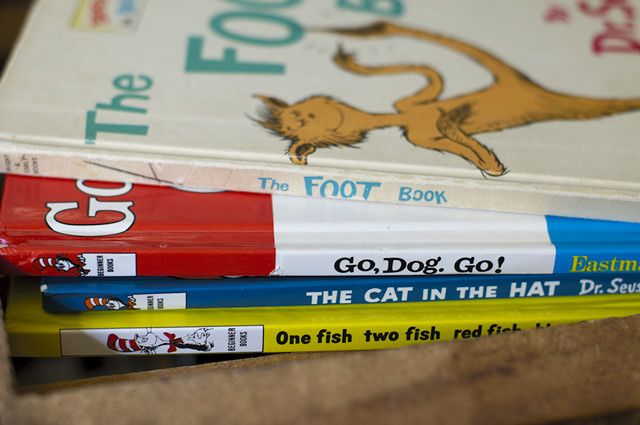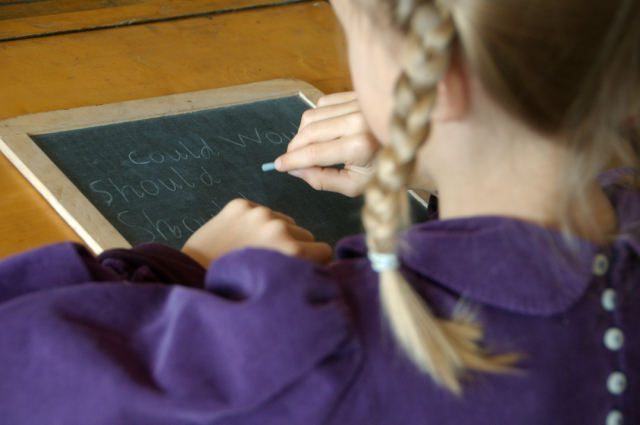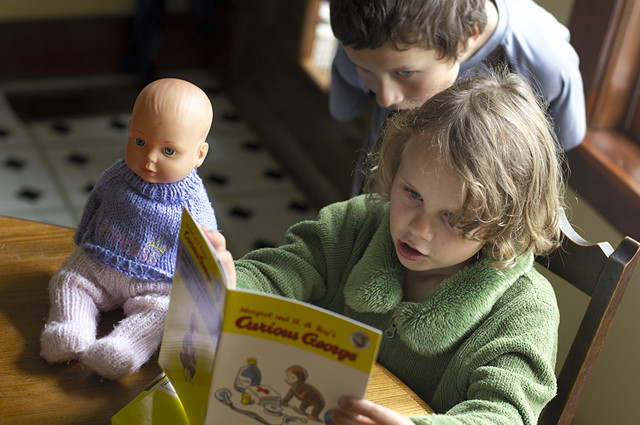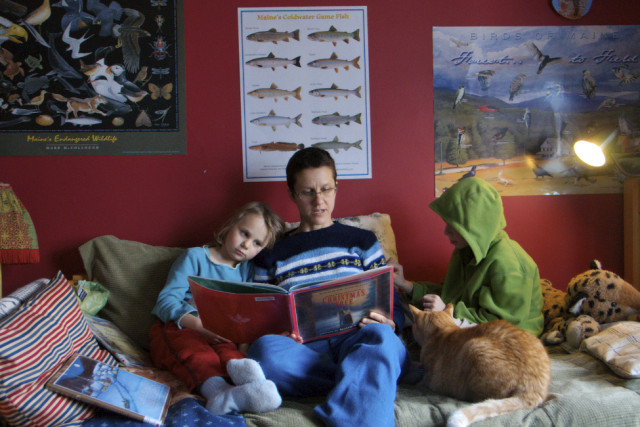Get posts by email
Learning to Read Part 1
October 21, 2010
I had intended to publish one reading post but when it was all said and done, hours and hours of writing and editing later, it was very long so I decided to publish it as two separate posts.
Here is the second post.

My Background:
I went to university to learn how to be a teacher. But I stayed well clear of the elementary education route, focusing instead on secondary biology and math, for a couple reasons. Firstly, large groups of small children say, more than four, overwhelm me. Secondly, I was totally freaked out by the idea of teaching children to read.
No thank you, I'd rather wait till all the basics of behavior and academics were well established and then teach the in-depth and nitty gritty of high school math and biology.

A couple things happened early on in my university career that side-tracked this plan.
- I met a marriage-material young man who wanted to homeschool his future children. A couple years later I became his wife. We decided to have children while we were young, ie: soon after graduating, which meant I didn't start a teaching career since we were dedicated to me being home with our babes.
- I realized that being a public school teacher meant dealing with a lot of stuff outside the realm of actual teaching. "Classroom management", unions, school politics, and extracurricular activities. I wasn't cut out for that. I loved helping students learn, the rest I could do without. Also, being a good public school teacher (I have utmost respect for good classroom teachers) takes an incredible amount of effort and love. More than this homemaker-at-heart was willing to give to be quite honest.
All of that to say I never did enter the teaching establishment, though I value my university education and did teach in private, small group settings throughout my six years in school (I took it slow to work part-time, save money and get married to my sweetie). And I'm sure by the time my kiddos get around to high school sciences and math I will have forgotten most of what I once studied to teach.
But to cut to the chase, although I have a Bachelor's degree in Education I didn't learn a lick about teaching someone to read.
In fact, this most foundational piece of education, learning to read, was what worried me most about homeschooling. Intuitively I knew it would unfold naturally and I would find the resources I needed when I needed them but I still wondered how I would do this most fundamental task - teach a child to read.
Before I share our experience with teaching our children to read, which will be in the next post, I need to lay out my philosophy because it has informed our methodology.

My Philosophy:
In no particular order here are some of my thoughts about reading.
- My long term goal is to raise children who know and appreciate that the answers to many of life's questions can be found in the written word. And I don't just mean books, technology is changing and reading is available in ever emerging mediums. I want my children to know that reading will help them understand the world, understand themselves, and help them develop their relationship with God through the written word of the Bible.
- For a child reading should be a very pleasurable experience. It should for adults also but we learn to apply ourselves to non-pleasure reading (like my camera manual) in order to reach our goals. Childhood memories of reading should be of morning cuddles on the couch, sunlit reading corners, quiet afternoons spent with books, and snuggly stories before bed.
- Children should read for their own learning, not for someone else. Ie: If I want to know what happened in the war of 1812 I can read about it myself, I needn't ask my daughter (who could care less) to read about it and tell me. It's her learning for pete's sake.
- In our society good reading and comprehension skills are foundational to successful learning in many academic and artistic disciplines.
- Reading is a lifetime endeavor. It is not a now or never skill. If you don't learn to read by 8, 9 or 12 you haven't missed the boat.
- Reading is not all there is. Yes, reading unlocks many mysteries of the world but there is also art, music, nature, dance, numbers, etc... Given the right learning environment children who are slow to read can immerse themselves in other ways of understanding the world and develop insights and geniuses many fluent readers do not.
- There is no one right way to learn to read. I am very pragmatic about many educational matters, do whatever works. We are all hardwired differently.

photo credit Celine
Please remember these are just my opinions, as is everything I write on this blog.
As I said earlier I have not a lick of training in teaching literacy, I also have very little experience with learning disabilities. I have nothing besides my own observations and deeply held convictions to back any of these ideas up.
Feeling as I do about the importance of both literacy and the emotions of early childhood reading I had initial anxieties about teaching our children to read.
How do you teach someone to read? What if I messed up? What if they just didn't "get it"?
Stay tuned for my next post on this topic where I discuss how we've taught and are teaching our children to read. Hope you can wait a couple weeks.
Filed Under
Resource Library
-

Granola Girl on Oct. 21, 2010, 9:10 p.m.
Reading seems to freak out most of the homeschool parents that I know. I'm glad someone is willing to just stand up and say that you can be intelligent and a great homeschooling parent but still freaked out about teaching your kids. Personally, chemistry is going to give me a run for my money!
As much as reading hasn't been an issue in our family, my mother has been a resource for others quite frequently.
My mother taught literacy here in the United States for years as a literacy and writing specialist. She now teaches English and literacy to kids in Dubai wanting to learn English. She had many good things to say, but has been rather horrible at teaching my son to read because he never had any reading issues and just loved to explore words. She is best working with kids who are having trouble.
She has been a sounding board for many homeschooling mommies who are friends of ours and who have been worried since their kids were getting to be 9 and up and still not reading. In most all the instances, the kids loved stories, they loved books, but they just didn't or wouldn't have interest in reading. The parents were getting concerned. One thing that she has really brought to attention is that public school is great at catching learning-to-read issues really early. As much as that happens from jamming it down kid's throats, it is nice to realize the issue sooner rather than later.
Though not all of the parents, but at least three, didn't realize the issue was really that their kid had some kind of vision problem with the letters (kinda like dyslexia or extreme astigmatism). Apparently this is really common. It isn't dyslexia, but there are multiple smaller things it could be. The families worked specifically on learning strategies and WHAM out of almost no where the kid is flying through the pages. They always loved the stories and were just had a physical problem with the reading. The kids were self conscious and didn't really want to talk about why it was hard. My husband has a learning disability like this and now is an English teacher. I would never have even known if he hadn't once told me when he was tired and the words were frustrating him and he wanted me to read them.
It wasn't every family, but it was quite a few. Some of the kids just didn't care about words at all and had other interests. I had no idea the issue was so prevalent so I thought I'd mention it if other people were getting worried.
-

Sea on Oct. 22, 2010, 3:13 a.m.
This is an interesting article. I agree with your points. My oldest daughter (she's 15), wanted me to teach her how to read when she was 4, and this was when I just started my elementary education degree. Her desire so intimidated me! Since I did not know a whole lot about literacy yet, we set a goal to visit the library every Friday and we picked out many books for the week. All I chose to do was read, read, read to her! Her desire to learn to read and us reading books everyday I believe is what made her the reader and writer today.
My son who is almost 8, has 'struggled' to read; even though we read daily as well he has responded well to explicit phonics instruction. I see my 5 year old who is ready to go with it like my oldest one did. I agree that each child is wired differently and we have to guide each child accordingly.
I currently work as a Reading Specialist, having earned my Master's in Reading and had intensive training on how the brain learns to read last school year to help implement the strategies into the school I work at. I will also note research has shown that 70-80% of kids will learn to read no matter what we do; it is the 20-30% we implement certain strategies and skills into the classroom to help. Thanks and I can't wait to see what you have to say next time!
-

Carrie on Oct. 22, 2010, 5 a.m.
Renee, your posts are touchstones for me in that they help me homeschool gently. Thank you.
-

Francesca on Oct. 22, 2010, 10:04 a.m.
I was more scared by numbers and arithmetics, than by letters and reading, but then Italian doesn't have all the phonic complexity that the English language has. I basically agree with all your points above. I found interesting to read about your background, and learn that it was your husband who had clear ideas about homeschooling your (future) kids.
-

Rebecca C on Oct. 26, 2010, 12:51 a.m.
I am also much more scared of teaching arithmetic than teaching reading. Reading just seems like such a natural thing in our house, whereas (to me, at least) math seems very foreign. Thankfully, I think I can handle the easy stuff, and Hubby (programmer/physicist) has agreed to teach higher-level math. I have a learning disability in math though, so it scares me that I will somehow mess them up in that area.
To be fair though, this is all speculation up to this point, since we don't even have any kids yet! We know we definitely want to homeschool, but I'm sure some of the specifics will change when reality strikes. :)
-
-

renee on Oct. 22, 2010, 12:08 p.m.
I am so enjoying all these comments and wish I had time to reply to each one. But my family is off this morning for a weekend of backpacking. I look forward to continuing this reading discussion later.
-

kyndale on Oct. 22, 2010, 5:56 p.m.
Hi Renee, I have to say that teaching Solomon and Eli to read freaks me out sometimes. Both aren't reading (Solomon is 8 and Eli is 4). Amelia told me that I taught her how to read but all I did was read to her a lot. And read her the Bob books when she was learning how to read. Boys usually read later and I think Solomon falls under that label. I don't doubt that he will learn to read. I do want him to love to read. That's my main goal.
-

Debbie Jamieson on Oct. 22, 2010, 9:44 p.m.
This has been an interesting read, Renee. I'm glad to read your philosophy and look forward to the methodology post. I have to say I agree with much of your philosophy but as an unschooler, I have never believed in the TEACHING aspect. Having said that, I'm also coming from a completely diffent perspective in that Isaac taught himself to read at 3 1/2. Teaching him has never been a worry for me. I wonder how I would feel as a mama of an older child who wasn't yet reading, although I believe whole-heartedly that children WILL read when they are ready. You do such a great job with your kids and are an inspiration to all of us home-learning families. xoxo -Debbie
-

Kika on Oct. 22, 2010, 9:54 p.m.
My two older kids read tons: my son (first born) didn't really 'get it' until about 6 and 1/2 years - before that I pushed too hard, I think (what was I thinking?), and there were lots of tears. My daughter was ready to read at four but b/c of my previous experience with my son I made her wait until her 5th b.day! After literally 20 mins of phonic instruction she began to read. I guess she already knew how but somehow thought she needed permission?! Anyways, my third child is much more like my son and while she writes words all the time (she's five) and enjoys being read to (and loves math and other learning) she is not wanting formal reading instruction. This time I hope to get it right and actually follow HER LEAD.
It is nice to hear more about your background.
-

Jenn on Oct. 23, 2010, 3:20 a.m.
Renee, my son learned to read at 8-9. He's a voracious reader now but only stuff he's interested in. Maddie learned to read at age 4. All on her own. Hard books (the Bible!) Hannah was about 7. Jo is 8 and just taking off reading. Ben is 6 and starting to read a bit. So they are all mostly older when they learn and that is fine by me. Because they do learn and they are loving reading!! Maddie read "Little Women" (the full length version, very thick!) in two days this past week! Whew!
-

Ellen on Oct. 23, 2010, 5:11 a.m.
Oh, thank you! I'm looking forward to the next post! While we plan to do traditional schooling, my kiddo is very, very interested in words and letter sounds and wants to know how to spell everything. I was just wondering to myself today what I can do to encourage her, since her "formal" reading instruction won't take place for probably another year at least.
Hope you all have a wonderful weekend backpacking!
-

Dee on Oct. 23, 2010, 5:47 a.m.
I can't wait to read your next post! I'm a brand new homeschooler (pulled my kids out of public school last week) and my greatest fear is that I won't be able to teach my Kindergartner to read! It's a little silly as he has already started to write and ask how to spell words, etc, but still.
-

Michelle Breum on Oct. 23, 2010, 2:20 p.m.
I'd like to share a post from my blog about teaching my children to read. http://beginningreadinghelp.blogspot.com/2010/02/my-daughters-path-to-reading.html
I have an elementary teaching certificate and taught public school for 7 years. Reading has always been my favorite to teach. If you have any questions, you can reach me at pacrapacma@gmail.com .
-

Nicole on Oct. 23, 2010, 11:15 p.m.
Hi Renee, hope you are having a lovely backpacking trip. I really loved your points about reading - especially 2,3 and 5. Isn't is great how every child is unique? Our experience - six different kids, six different ways of learning. Some learned early, some learned late. With our first, I began as a "school at home" sort of teacher but it lead to frustration on her part and feelings of failure on mine. So I put away the workborks and read to her. A lot. Every day. I remembered favorite books of mine as a child and I read her those, as well as whatever interested her at the time. We also did story writing (her telling me a story while I wrote it out for her); pretty soon she knew a lot of the words herself. It worked, she learned and she reads now, for knowledge of course, but mostly because she simply loves reading.(Which, of course, really was my goal in the first place!) Her sisters learned more or less the same way, with patience, time and a love of reading. My son is following the same pattern right now. I have used early reader books, but more just to read out loud and have her/him point out words she/he knows to build confidence. Looking forward to part 2 :)
-

renee on Nov. 1, 2010, 12:52 a.m.
Thank You Nicole. I love it when mothers of many share their experience.
-
-

Earth Mama on Oct. 28, 2010, 1:40 p.m.
Oh sheesh, this is a wonderful post. My olest has a different dad and he is not on the same page of homeschooling that we are. Now that she is 10, it is getting to be more and more of an issue to find a balance between letting her learn at her own pace and having her progress at a "not so worrisome" pace for her dad. She recently started reading, at 9 1/2, and has just made the leap to chapter books (Junie B Jones) this week. I know technically she might be "behind" BUT even kids in school are "behind". I also know that when thet learn things when they are ready, they speed along by. It can be so frustrating when so many ignore the fact that each individual is reading in their own time. Thank you for sharing your input!
:)Lisa
-

Laura on Oct. 30, 2010, 4 p.m.
This is so interesting. I know we're a ways off from homeschooling, or any schooling really, in our house but the thought of teaching E to read is completely terrifying to me! I started reading at a very young age and I've loved it ever since, but I don't know why that is. I don't recall my parents pushing it, or even helping me much, but they must've done something right? ;) I look forward to reading your future posts on the matter!
-

Heather on Oct. 31, 2010, 6:39 p.m.
What a great post! I totally agree with your philosophy of reading. I taught 2 - 6 year olds in a Montessori school before I started staying at home with my own (homeschooled) smalls...My children are both under 2 and not reading yet, but I have plenty of experience guiding other people's children through learning to read.
I've often witnessed a real miasma of stress around reading for children -- I think often due to the "earlier is better" attitude that seems to plague educators these days (both at home and in schools). While I appreciate all the further learning that opens up once a child learns to read, if the process of learning is stressful or not enjoyable, the child will never WANT to read -- and then you're really no further ahead. If you can have the patience and trust in your child to let her learn to read when she's ready and in a way that suits her, even if she's "late" to learn to read, she'll continue to enjoy and seek out reading for the rest of her life, and that is something worth waiting for in my opinion.
I have always been thankful to my own parents for trusting us to learn in our own time, and not stressing us out. I attended public school, struggled with reading, was tested inconclusively for learning disabilities, and read far below my grade level until the summer after 6th grade. The way my mother tells it: that summer I asked her (much to her surprise) to take me to the library, and plowed through stacks of books that interested me that summer, gradually working my way up until I was reading above grade level by the time I entered 7th grade. I went on to be on the Dean's list with straight As in University, and as an adult am a voracious reader.
Looking forward to the next post and everyone's interesting and comments.
-

renee on Nov. 1, 2010, 12:49 a.m.
Heather, Thank you so much for sharing your experience. As you will read in my next post I have a couple late readers. And none of my children have been early readers. But we love books and reading and I think that is more important than how soon a child learns to read.
-
-

SaraR on Nov. 2, 2010, 7:58 p.m.
I enjoyed reading about reading! We're just starting out the homeschooling road with my 4 year old. She's a bit of a smartie and already reading some. I haven't done much in the way of real teaching yet as she is only 4 and I'm looking forward to reading what else you have to say on the matter. I really loved your second bullet point. It made me want to curl up in a sunny corner with a new book. Unfortunately the 3 monkeys needing my constant attention would not appreciate that too much.
-

katy on Jan. 15, 2011, 1:37 a.m.
It is interesting the comments about teaching kids to read, their growing or delayed interests in reading and learning disabilities. My husband and I have jumped through hoops with doctors and school administrators (not homeschooling her "yet", but it's a goal) to find out my now 9 year old daughter couldn't read by age eight. Even with countless in-school tutors, after school help and tutors at home, we finally found out she had 4 learning disabilites and one physical disability of ADHD. The funny thing is throughout all that she has endured, experienced and is experiencing...she loves when we read together and it can be anything...the interest is definitely there. It's just that her body is not cooperating with her thirst for knowledge. I'm glad there are folks out there that are writing articles like this and that there are folks that have such interesting, heart-felt and inciteful comments. I don't feel like we're alone in our struggles or challenges.
You can subscribe to comments on this article using this form.
If you have already commented on this article, you do not need to do this, as you were automatically subscribed.






Natalia on Oct. 21, 2010, 7:57 p.m.
Great post, and while I might not agree with you on the God bit, I do on most of the rest. If it is any consolation - this evening, we all went for dinner at the local pub, as we do once a week or so. The six year old got to choose whatever he wanted to bring along to read, in case he got bored. And he brought two books along, and was anxious to read them, because despite having read them a few times before, he wanted to get into them again 'because it is interesting'. The two books? Children's versions of Shakespeare's Henry V and Richard III. Unprompted. The reason I share this is that if you help your children develop the basic skill (reading) and give them access to a lot of stuff, usually they will find their way to the quality. Don't get me wrong, this is a boy who also likes to borrow Beast Quest books from the library. But considering what else he will choose to read off his own shelves, I'm not too worried.